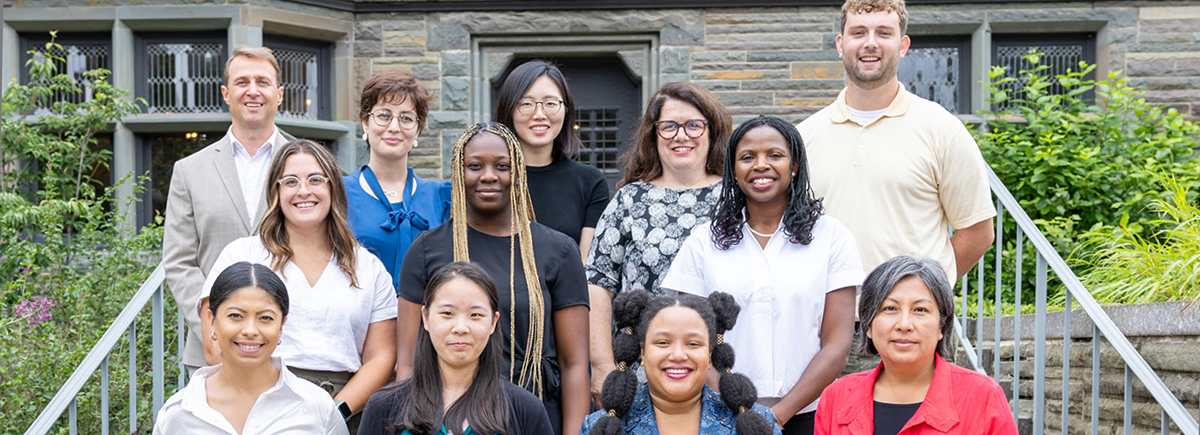Pre-Doctoral Training in Aging and Health
 The IOG Pre-doctoral Training Program is open to a limited number of graduate students at Wayne State University, post master's degree or equivalent, who are committed to excellence in research and a career focused on aging. We encourage an interdisciplinary research environment and have had students from disciplines such as: anthropology, economics, sociology, occupational therapy and psychology. The goal of the training program is to prepare students for professional careers in research, with an expertise in aging and health.
The IOG Pre-doctoral Training Program is open to a limited number of graduate students at Wayne State University, post master's degree or equivalent, who are committed to excellence in research and a career focused on aging. We encourage an interdisciplinary research environment and have had students from disciplines such as: anthropology, economics, sociology, occupational therapy and psychology. The goal of the training program is to prepare students for professional careers in research, with an expertise in aging and health. 2024/2025 Predoctoral Tainees
For more information contact Tam Perry, Ph.D., Director, Pre-Doctoral Training at: teperry@wayne.edu
Focus & Funding
Our training program has four major foci, each designed to produce outstanding gerontological researchers:
- Apprenticed research opportunities, premised on regular, frequent contact with mentors in a program that values interdisciplinary research. The research and training of most students in the program emphasizes the empirical testing of theoretically derived hypotheses concerning an array of health and aging issues. The research projects of some students involve recruiting older adults from the surrounding communities. These students often gain first-hand knowledge of the challenges associated with aging, and the importance of family and health care. Other students choose to analyze large-scale secondary data sets for their research on aging.
- Specific disciplinary education, combined with multidisciplinary research training. Our training faculty currently include psychologists, sociologists, anthropologists, economists, health services researchers, nurses, and allied health professionals. We believe graduate training in both a traditional core discipline and in gerontology is the best preparation for a research career in aging and health. We live by this ideal by having students and faculty connected to disciplinary homes and to a strong, research-oriented, multidisciplinary Institute of Gerontology.
- Strong methodological emphasis. As part of their training, students normally take 12-15 credits each semester. This includes coursework focused on discipline-specific material, along with courses on statistical methods appropriate for the study of aging.
- Aging and health focus. Training faculty and students in the program are committed to research relevant to aging and health. Health encompasses both physical and mental health. Faculty work on a wide range of topics, including how the brain ages, successful aging, including what that concept means to different individuals, financial decision making among older adults, the effects of public policy relevant to seniors, and determinants of health disparities among vulnerable older populations. Several of the studies underway at the Institute of Gerontology are based in the Detroit metropolitan area, which is a rich and heterogeneous region, and amenable to enhancing the diversity and heterogeneity of research samples.
Funding
- An award of $1,500 per semester (students are permitted to have other sources of funding, unless prohibited by WSU)
- Up to $800 to participate/present their research at the Annual Gerontological Society of America (GSA) conference
- Eligibility to apply for $500 in Fall and Winter semesters to participate in a relevant scientific conference where the student is the first and presenting author
Required activities in the Training Program include:
- Attend Colloquia/Professional Development Seminars twice a month
- Establish a Faculty Mentoring Team to oversee the student's work
- Develop goals for the academic year in the fall and evaluate achievements in the spring
- Publish at least one paper a year
- Volunteer time for community service at IOG-sponsored events
Pre-doctoral Training Cognitive Neuroscience Track
Graduate students in the Cognitive Neuroscience acquire a wide range of research skills including: computer-aided processing and analysis of MRI images, design and administration of cognitive and neuropsychological tests and statistical analysis. Our neuroimaging projects are conducted at the Wayne State University MRI Center in collaboration with E. Mark Haacke, Ph.D. On graduation, students secure post-doctoral training at other distinguished aging laboratories, win federally funded research grants of their own, and gain employment as academics and researchers.
ConnectLab: Brain Connectivity and Aging
Principle Investigator: Jessica S. Damoiseaux
Daughtery: Healthy Brain Aging Lab
Principle Investigator, Ana Daughtery
ana.daugherty@wayne.edu